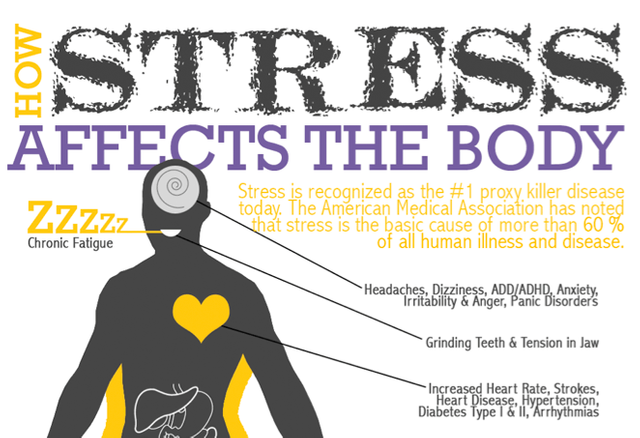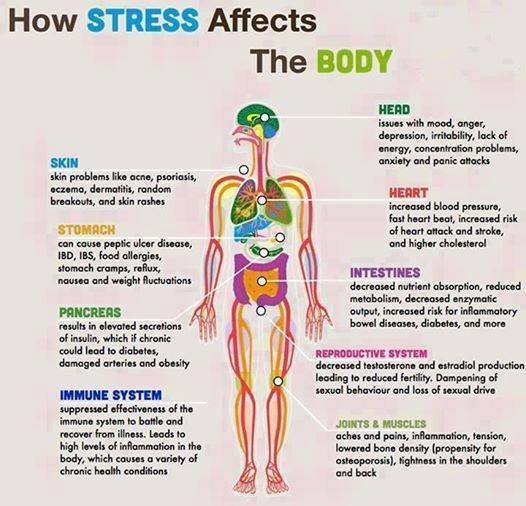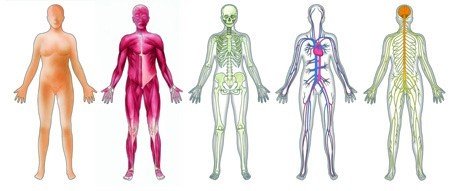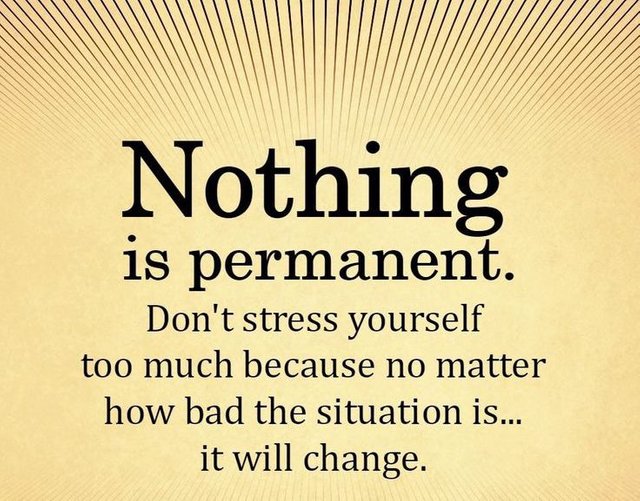How does the human body affected by the impact of stress

Image Source
At the point when humans initially developed, their lifestyle was clearly altogether different from the lifestyles that we have today. Give us a chance to consider what may have happened when a prehistoric human was being pursued by a predator. At the point when the body distinguishes a wellspring of stress the sympathetic branch of the autonomic nervous system is actuated.
This fortifies a number of changes to the normal working of the body in a way that would have helped the prehistoric human to adjust to the wellspring of stress.
These progressions include:
- Increase in heart rate and blood pressure
- Constriction of blood vessels in a few territories of the body
- Increase in blood sugar level
- Redirection of blood flow far from furthest points towards major organs
- Breathing changes to wind up speedier and more profound
- Digestion stops or moderates
- Sweating increases

Image Source
These progressions occur in light of the fact that the body is beginning to set itself up to react to the risk. They are interceded by neurohormonal changes, including the generation of two hormones, adrenaline and noradrenaline, from the adrenal glands. These glands are found simply over the kidneys. The two hormones flow in the bloodstream and target such organs as the heart, in this case expanding its beating. Notwithstanding this reaction by the sympathetic nervous system, there is another neurohormonal system included.
Discovery by the brain of a test or danger makes an arrangement of actions that leads the increased discharge, additionally by the adrenal glands, of a class of hormones called corticosteroids. In humans, a critical individual from this class is cortisol. These hormones help to set up the body for action and struggle by expanding the arrival of fuels, for example, glucose from stores in the body. These fuels can be utilized by the cells as a wellspring of energy.
What really occurs in the body to influence this reaction to happen?
Cannon trusted that anything which agitates the homeostatic balance of the body might be viewed as a stressor. The reaction is exceptionally versatile in some stressful circumstances since it prepares the creature to react rapidly to threat, for our prehistoric progenitors, in this manner, it was related with survival. How much such a reaction is versatile in present day society, in any case, is sketchy.
While this reaction might be helpful for the time being, the body can't maintain it for long without hurting health. Much of the time this does not represent a critical issue. A wellspring of stress presents itself and exploit the physiological changes occurring in the body to react to the danger. Accordingly, the danger is killed and physiology comes back to normal.

Image Source
What happens when the wellspring of stress is ceaseless?
The physiological changes related with the stress are never again versatile, and they can in truth have a critical negative effect on health. These impacts were demonstrated plainly by Hans Selye in a progression of animal analyses which analyzed the health results of delayed introduction to stress. In view of a progression of investigations of rats who were uncovered over a drawn out time frame to a wide assortment of stressors, Selye found that the rats had built up a scope of physical issue which could discovered comparative outcome to human. Such disorders are;
- Peptic ulcers
- Enlarged adrenal glands
- Shrunken immune tissue

Image Source
References:
Reminiscences of Hans Selye, and the Birth of “Stress”
Hans Selye: The Discovery of Stress
Evaluating the Role of Hans Selye in the Modern History of Stress
Walter Cannon's "Fight or Flight Response" - "Acute Stress Response
Sometimes there may also be something medically wrong with us that makes us very stressed. I know when I was very anemic and didn't realize it I was incredibly stressed and my family thought I was nuts. I returned to normal once the anemia was treated.
Downvoting a post can decrease pending rewards and make it less visible. Common reasons:
Submit
Thinking or worrying too much about something makes us stress.
Downvoting a post can decrease pending rewards and make it less visible. Common reasons:
Submit
Having suffered from a heart attack that was mostly caused by workplace stress. I know this all too well, had I been able to escape the environment sooner I probably would have not had this issue.
Downvoting a post can decrease pending rewards and make it less visible. Common reasons:
Submit
Good to know that you can now manage to avoid a workplace that negatively affects health.
Downvoting a post can decrease pending rewards and make it less visible. Common reasons:
Submit
Yeah I jumped from that sinking ship as fast as I possible could.
Downvoting a post can decrease pending rewards and make it less visible. Common reasons:
Submit
@juvyjabian nice piece 👏...i really love your write up about stress...especially the last image 🖒 nothing is permanent
Downvoting a post can decrease pending rewards and make it less visible. Common reasons:
Submit